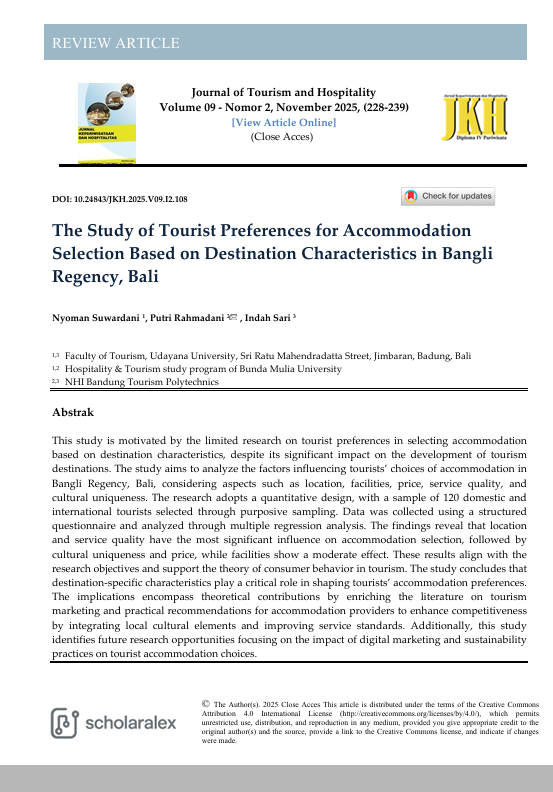The Study of Tourist Preferences for Accommodation Selection Based on Destination Characteristics in Bangli Regency, Bali
Keywords:
Tourist Preferences, Accommodation Selection, Destination CharacteristicsAbstract
This study is motivated by the limited research on tourist preferences in selecting accommodation based on destination characteristics, despite its significant impact on the development of tourism destinations. The study aims to analyze the factors influencing tourists’ choices of accommodation in Bangli Regency, Bali, considering aspects such as location, facilities, price, service quality, and cultural uniqueness. The research adopts a quantitative design, with a sample of 120 domestic and international tourists selected through purposive sampling. Data was collected using a structured questionnaire and analyzed through multiple regression analysis. The findings reveal that location and service quality have the most significant influence on accommodation selection, followed by cultural uniqueness and price, while facilities show a moderate effect. These results align with the research objectives and support the theory of consumer behavior in tourism. The study concludes that destination-specific characteristics play a critical role in shaping tourists’ accommodation preferences. The implications encompass theoretical contributions by enriching the literature on tourism marketing and practical recommendations for accommodation providers to enhance competitiveness by integrating local cultural elements and improving service standards. Additionally, this study identifies future research opportunities focusing on the impact of digital marketing and sustainability practices on tourist accommodation choices.
Downloads
References
Buhalis, D., & Foerste, M. (2015). SoCoMo marketing for travel and tourism: Empowering co-creation of value. Journal of Destination Marketing & Management, 4(3), 151–161. https://doi.org/10.1016/j.jdmm.2015.04.001
Chen, C. F., & Chen, F. S. (2010). Experience quality, perceived value, satisfaction and behavioral intentions for heritage tourists. Tourism Management, 31(1), 29–35. https://doi.org/10.1016/j.tourman.2009.02.008
Dolnicar, S. (2002). Business travellers’ hotel expectations and disappointments: A different perspective to hotel attribute importance investigation. Asia Pacific Journal of Tourism Research, 7(1), 29–35. https://doi.org/10.1080/10941660208722107
Han, H., & Ryu, K. (2009). The roles of the physical environment, price perception, and customer satisfaction in determining customer loyalty in the restaurant industry. Journal of Hospitality & Tourism Research, 33(4), 487–510. https://doi.org/10.1177/1096348009344212
Hu, Y., & Ritchie, J. R. B. (1993). Measuring destination attractiveness: A contextual approach. Journal of Travel Research, 32(2), 25–34. https://doi.org/10.1177/004728759303200204
Kotler, P., Bowen, J. T., & Makens, J. C. (2017). Marketing for hospitality and tourism (7th ed.). Pearson.
Lee, C. K., Yoon, Y. S., & Lee, S. K. (2007). Investigating the relationships among perceived value, satisfaction, and recommendations: The case of the Korean DMZ. Tourism Management, 28(1), 204–214. https://doi.org/10.1016/j.tourman.2005.12.017
Litvin, S. W., Goldsmith, R. E., & Pan, B. (2008). Electronic word-of-mouth in hospitality and tourism management. Tourism Management, 29(3), 458–468. https://doi.org/10.1016/j.tourman.2007.05.011
Lu, C., Berchoux, C., Marek, M., & Chen, B. (2015). Service quality and customer satisfaction: Qualitative research implications for luxury hotels. International Journal of Culture, Tourism and Hospitality Research, 9(2), 168–182. https://doi.org/10.1108/IJCTHR-10-2014-0087
Manhas, P. S., Manrai, L. A., & Manrai, A. K. (2016). Role of tourist destination development in building its brand image: A conceptual model. Journal of Economics, Finance and Administrative Science, 21(40), 25–29. https://doi.org/10.1016/j.jefas.2016.01.001
Meng, F., Tepanon, Y., & Uysal, M. (2008). Measuring tourist satisfaction by attribute and motivation: The case of a nature-based resort. Journal of Vacation Marketing, 14(1), 41–56. https://doi.org/10.1177/1356766707084218
Pizam, A., & Ellis, T. (1999). Customer satisfaction and its measurement in hospitality enterprises. International Journal of Contemporary Hospitality Management, 11(7), 326–339. https://doi.org/10.1108/09596119910293231
Prayag, G., & Ryan, C. (2012). Antecedents of tourists’ loyalty to Mauritius: The role and influence of destination image, place attachment, personal involvement, and satisfaction. Journal of Travel Research, 51(3), 342–356. https://doi.org/10.1177/0047287511410321
Setiawan, P. Y., Prayudi, A. A., & Wibawa, I. M. (2020). Factors affecting tourist loyalty in Bali: The role of satisfaction and destination image. Journal of Tourism, Hospitality and Culinary Arts, 12(2), 32–47.
Su, L., Swanson, S. R., & Chen, X. (2016). The effects of perceived service quality on repurchase intentions and subjective well-being of Chinese tourists: The mediating role of relationship quality. Tourism Management, 52, 82–95. https://doi.org/10.1016/j.tourman.2015.06.012












